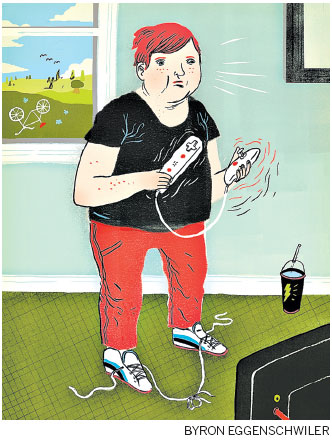
Getting our sedentary, overweight children off the couch is a challenge. The Nintendo Wii game console offered the prospect of getting children to exercise without even leaving home.
Its "exergames" led to hopes that fitness could turn into irresistible fun.

But "active" video games do not produce an increase in physical activity. That's according to a study by the Children's Nutrition Research Center at Baylor College of Medicine in Houston, and published this year in Pediatrics, the official journal of the American Academy of Pediatrics.
The study participants were children 9 to 12 years old who had a body mass index above the median and whose households did not already have a video game console. Each was given a Wii. Half were randomly assigned to a group that could choose two among the five most physically demanding games. The other half could choose among the most popular passive games.
The participants wore accelerometers to measure physical activity over 13 weeks. The study found "no evidence that children receiving the active video games were more active in general, or at any time, than children receiving the inactive video games."
"When you prescribe increased physical activity, overall activity remains the same because the subjects compensate by reducing other physical activities," says Anthony Barnett, an exercise physiologist and a consultant at the University of Hong Kong, and an author of the Pediatrics article.
Changing sedentary behavior is extremely difficult, says Dr. Charles T. Cappetta, an executive committee member of the Council on Sports Medicine and Fitness at the American Academy of Pediatrics. "It may seem that active video games are an easy solution to getting kids off the couch," he says. "But as this study and others show, they do no such thing."
He says "live sports" - outside the home - "remain the gold standard to get cardiovascular benefit."
Last year, the Journal of Strength and Conditioning Research published a study of use of the Wii Fit by adults and children in homes over three months.
Scott G. Owens, an associate professor of exercise science at the University of Mississippi, and his colleagues gave Wii Fit games to eight households. Accelerometers were used to set the baseline of the participants' physical activity and ran fitness tests. Measurements were taken again 6 and 12 weeks after.
The Wii Fit was used an average of 22 minutes a day by everyone in the household in the first six weeks, but only 4 minutes a day in the second six weeks. At the end, fitness measures were essentially unchanged.
For physical activity with measurable health benefits, children need to get outdoors, without controllers and TV monitors.
The New York Times

(China Daily 07/22/2012 page11)